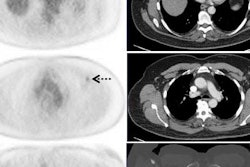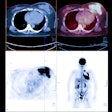Dear Molecular Imaging Insider,
FDG-PET/CT has long been a valuable modality for staging various forms of cancer and assessing subsequent treatment and therapy. However, it does not offer much direction in the way of predicting clinical outcomes for patients with peripheral T-cell lymphoma.
Israeli researchers found that FDG-PET/CT scans performed during or after chemotherapy were unable to sufficiently predict progression-free survival or overall survival in this patient population. On the other hand, a negative FDG-PET/CT result can rule out the presence of bone marrow involvement in 90% of peripheral T-cell lymphoma cases. More details are available in this edition's Insider Exclusive.
FDG-PET/CT, however, can offer insight into the success of radiation therapy in patients with spinal metastases. South Korean researchers found that patients with a reduction of more than 70% in maximum standardized uptake values on FDG-PET/CT scans obtained before and after treatment had better progression-free survival than patients below that mark.
While assessing breast cancer in men is an uncommon clinical use for FDG-PET/CT, the hybrid modality can be beneficial for those with the disease. A new study from researchers at Memorial Sloan Kettering Cancer Center and Weill Cornell Medical College concluded that FDG-PET/CT achieved results comparable to those in women in regard to accurate disease staging. It also uncovered unsuspected distant metastases in 18% of cases, similar to rates found in women with breast cancer.
In global molecular imaging news in the Molecular Imaging Community, U.K. researchers recently applied their newly developed motion correction algorithm to PET/MRI and achieved accurate scans with fewer false positives. As a result, readers also became more confident in their quantifications and detection of PET-avid lesions using multiple tracers.
Finally, PET/MRI scans with a gallium-68 (Ga-68)-labeled radiopharmaceutical that homes in on prostate-specific membrane antigen (PSMA)-11 could become a mainstay in prostate cancer detection. Researchers from the University of California, San Francisco found that Ga-68 PSMA-11 PET/MRI was significantly more proficient than multiparametric MRI in detecting tumors in patients.




















